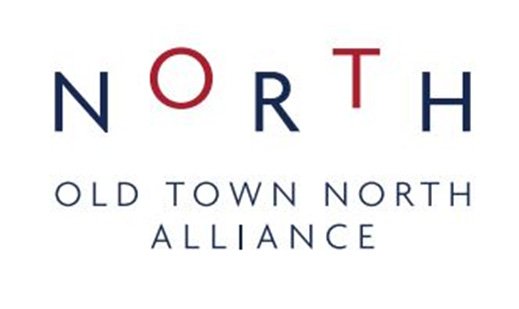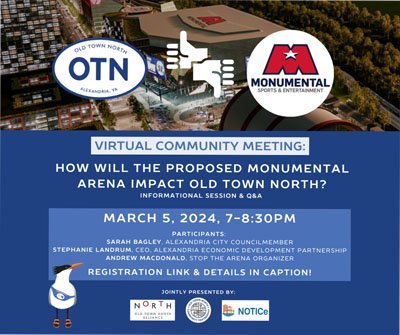Arena Meeting Focused on Old Town North Attracts Over 100
Tuesday evening, the Old Town North Alliance (OTNA),the North Old Town Independent Citizens’ Association (NOTICe), and the Old Town North Community Partnership (OTNCP) hosted a virtual meeting to hear about the potential impacts of the proposed Monumental Sports Arena in Potomac Yard on the Old Town North neighborhood. 144 people registered, and nearly 100 attended the meeting. Presenting were Stephanie Landrum, CEO, Alexandria Economic Development Partnership (AEDP), Sarah Bagley, Alexandria City Council Member, and Andrew MacDonald, leader of the Stop the Arena organization and former Alexandria Vice Mayor.
Ryan Whitaker, President, OTNA, moderated the session by allocating presentation time to each presenter, and then asking audience-submitted questions of each. Judging by the more than 60 questions emailed to OTNA in advance of the event, attendees' main concerns were transportation/parking impacts, and the expenditure of tax money on a sports arena.
A major concern of neighborhood residents is impacts to local roads, particularly Slaters Lane and the George Washington Memorial Parkway. Citing a study by Kimley-Horn, the City believes that transportation issues can be addressed with the $200 million allocated in the project. Slaters Lane at Route 1 and the GW Parkway is on the improvement list; specific transportation plans are to be fleshed out during the upcoming land use process. Arena parking is not expected in Old Town North, as it is relatively distant and a pedestrian route would be difficult. The project will help activate the investment made in the Potomac Yard Metro station.
“The project fails on transportation,” according to Dr. MacDonald. He cited the efforts generated by the Amazon development to make Route 1 more pedestrian and bicycle friendly, saying that these positive plans are “at odds” with an arena’s need to move tens of thousands of fans to games. Further, by measuring traffic impacts only during a peak hour of 5:00 to 6:00 PM, Dr. MacDonald believes Kimley-Horn missed studying the actual effects of adding game-night traffic. Another of his concerns is the limited capacity of the Metro station to handle the quantity of concentrated ridership.
When questioned if the totality of projects is considered when planning transportation improvements, Ms. Landrum and Ms. Bagley responded that it is. Ms. Bagley used her experiences with the Council of Governments (COG) and the Virginia Railway Express (VRE) as examples of coordination and knowledge of various projects in multiple jurisdictions.
AEDP believes that the Arena will contribute to the City’s tax base, helping to maintain services to residents while ameliorating residential tax increases. Ms. Landrum’s presentation primarily addressed the anticipated economic benefits of the Arena to the City. She stated that market forces have reduced the percentage of City real estate taxes generated by commercial properties from 30% in 2008 to 18% currently, with the corresponding residential property owners’ share increasing from about 70% to 82%. Ms. Landrum cited as an example Mr. Whitaker’s own Old Town North redevelopment project, in which three vacant office buildings will be replaced with multi-family housing. In addition to increasing commercial tax revenue, the Arena development is expected to act as a catalyst for other redevelopment in the area. Without the Arena, Potomac Yard is predicted to remain as-is for the next twenty years, since the existing Target store is poised to renew its lease for that period.
Ms. Landrum and Ms. Bagley expressed belief that City expenditures will be justified by building a revenue-producing facility. Approximately 650 Monumental Sports office jobs would be relocated, and these would remain union jobs. Monumental would operate the performing arts venue, which will have a capacity of 4,000 to 8,000, but time would be reserved for City functions such as high school graduation ceremonies.
Dr. MacDonald, however, stated that sports arenas are generally money losers, and that the City’s assumptions are unproven. He was critical of how the City has handled the public process, including what he said was initial difficulty accessing the economic and fiscal impact and transportation studies conducted. Contradicting the City’s assertion that commercial development is in decline, he stated his belief that the City has had a great deal of commercial development.
Both Ms. Landrum and Ms. Bagley emphasized that many of the project details being requested will be revealed as part of the City’s land use process, which cannot begin until the Virginia General Assembly and the City Council approve the concept and financing plan. Answering a question about why the City is willing to amend the Potomac Yard Small Area Plan to accommodate the Arena, both speakers agreed that changing market dynamics make the current Plan unrealistic in the amount of anticipated office development. Answering another question, they stated that City staffing is adequate to meet the additional demands a Potomac Yard amendment process would create.
Housing, especially the City’s affordable housing preservation goals, will be improved because the property owner, JBG Smith, has committed to identifying 500 existing market-rate units citywide, purchasing them and maintaining them as affordable rental housing. Also, the Arena development is expected to jump-start the construction of 5,400 new housing units nearby.
Regarding environmental factors, Ms. Landrum highlighted potential improvements to stormwater management (SWM). The current shopping center and asphalt parking area have no SWM facilities, but a new development would incorporate SWM and water quality measures. Dr. MacDonald’s focus was on the negative effects of additional vehicles on air quality.
Finally, Mr. Whitaker was able to ask questions on which all the presenters agreed: yes, the Wizards will win another NBA championship and the Capitals will win the Stanley Cup in a few years.
More information is available at the following websites:
AEDP: Monumental ALX.com
Monumental Sports: MonumentalOpportunity.com
Stop the Arena: stopthearena.org
Thank you to everyone who participated in, submitted questions for, and attended the virtual meeting.
Unfortunately, in attempting to record the session, Mr. Whitaker later discovered that the recording had ended after only a minute or so. OTNA regrets not having a recording to post online as we had anticipated, but instead we have made this article more detailed than originally planned.

